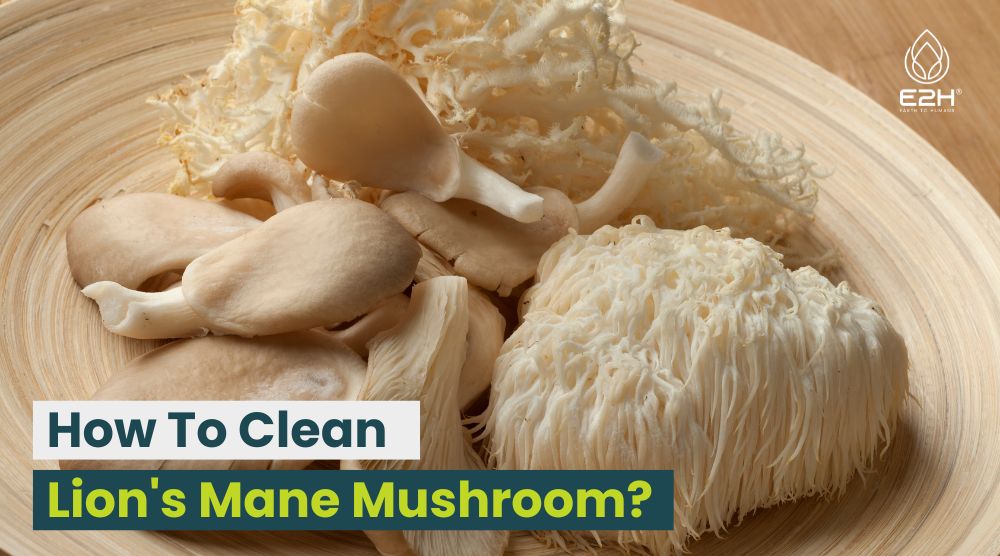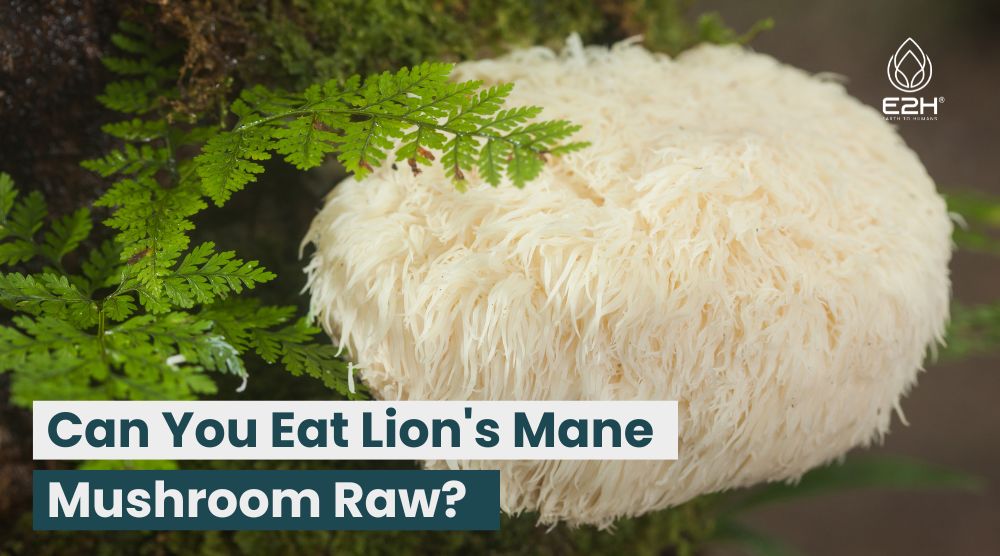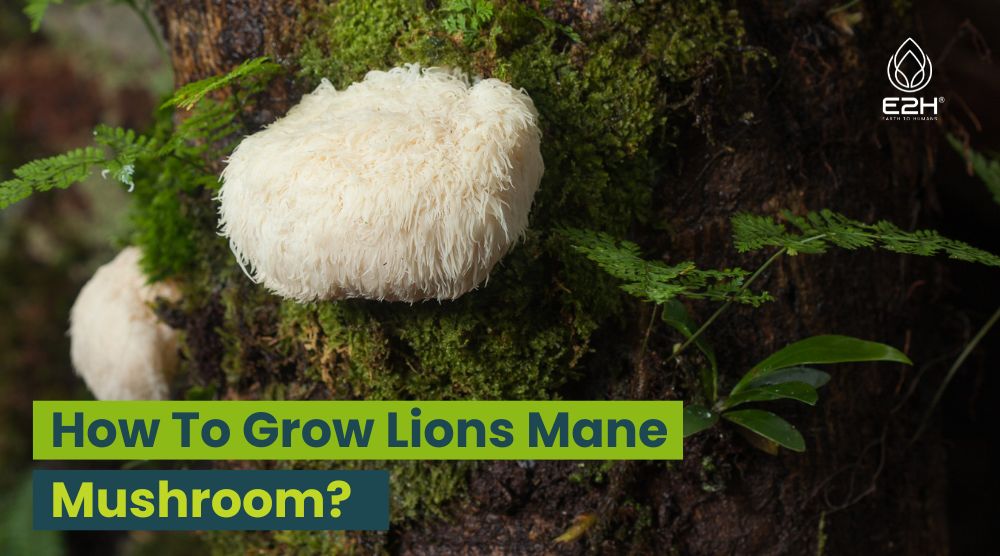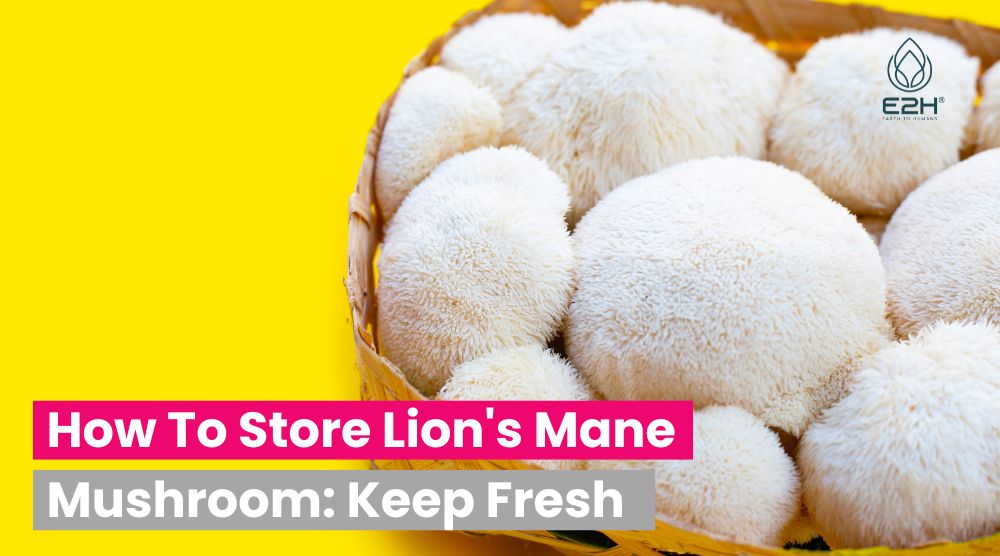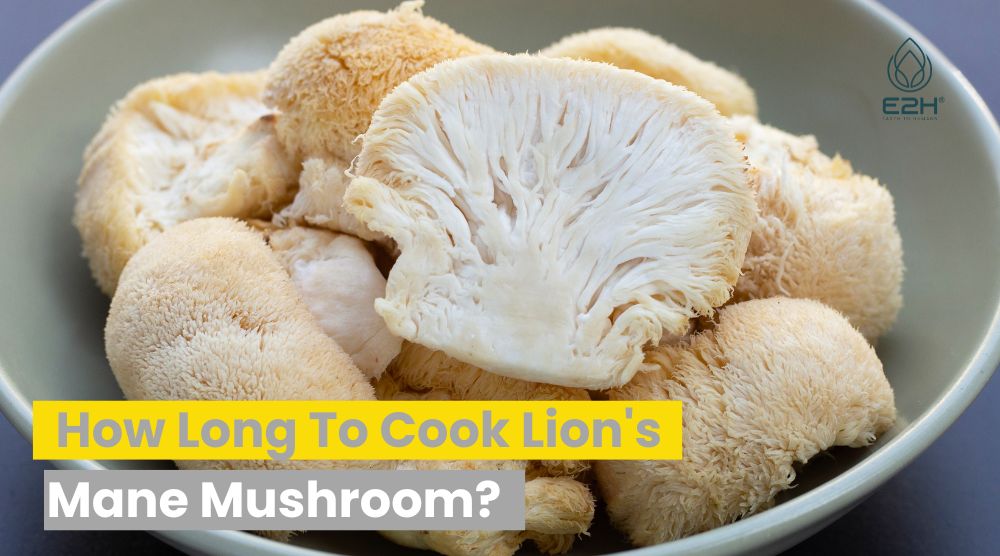How To Clean Lion’s Mane Mushroom: To clean and cook Lion’s Mane mushrooms, inspect for contaminants, gently brush the spines, avoid soaking, and rinse clean mushrooms minimally if needed before cooking. This ensures they remain safe and maintain their unique texture and flavor while cooking.
What is Lion’s Mane Mushroom?
Lion’s Mane mushroom is a medicinal and edible fungus that belongs to the Hericium genus. Its name is derived from its unique appearance, which resembles the mane of a lion. This fascinating mushroom is widely esteemed not only for its delicious taste but also for scientific name of its potential health benefits. It contains bioactive compounds like beta-glucans, erinacines, and hericenones, which are believed to contribute to its therapeutic properties.
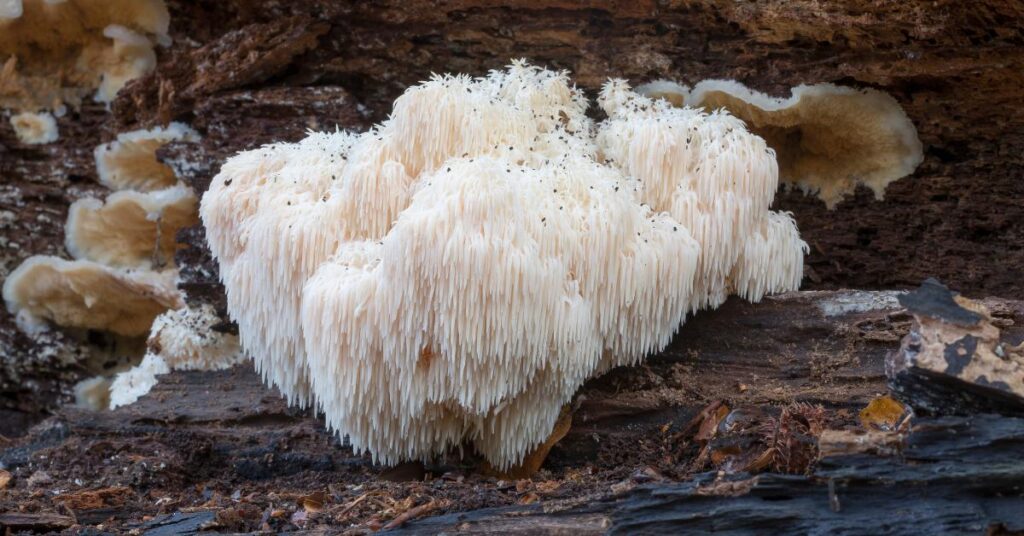
Health Benefits of Lion’s Mane Mushroom
- Enhanced Cognitive Function: Lion’s Mane mushroom has shown promising effects on brain health. Studies suggest that its compounds may stimulate nerve growth factor (NGF) production, promoting brain cell growth and potentially enhancing cognitive functions.
- Nervous System Support: The bioactive compounds in Lion’s Mane mushroom may have a positive impact on the central nervous system, aiding in nerve repair and protection.
- Immune System Boost: Regular consumption of Lion’s Mane mushroom may help strengthen the immune system due to its immunomodulatory properties.
- Digestive Health: This mushroom contains fibers and enzymes that can support a healthy digestive system and improve gut health.
- Anti-Inflammatory Effects: Lion’s Mane mushroom’s anti-inflammatory properties can assist in reducing inflammation and supporting overall well-being.
Harvesting Lion’s Mane Mushroom
Before delving into the cleaning process of cook raw lion’s mane mushroom brush, it’s essential to understand the proper harvesting techniques for Lion’s Mane mushroom. Harvesting should be done gently brushing with care to ensure the sustainability of the whole lions mane mushroom and population and to avoid damaging the mycelium network.
To harvest Lion’s Mane mushroom, follow these steps:
- Identify Mature Specimens: Look for Lion’s Mane mushrooms with fully developed, shaggy white spines. Avoid picking young or immature specimens.
- Use a Sharp Knife or Scissors: To avoid unnecessary harm to the mushroom’s growth base, use a clean, sharp knife, or scissors to cut the stem about an inch above the surface.
- Leave Some Behind: Whenever possible, leave some Lion’s Mane mushrooms in the wild to allow for spore dispersal and the continued growth of the fungus.
Cleaning Lion’s Mane Mushroom
Cleaning Lion’s Mane mushrooms is a crucial step to ensure they are safe for consumption and to maintain their flavor. Follow these steps to clean them properly:
- Inspect for Contaminants: Check the mushrooms for any signs of mold, discoloration, or foreign objects. If you find any, remove them carefully.
- Gently Brush the Spines: Using a soft-bristled brush or a damp cloth, gently brush off any dirt or debris from the spines of the mushroom.
- Avoid Soaking: Unlike some other mushrooms, Lion’s Mane mushrooms should not be soaked in water, as they can absorb excess moisture and lose their unique texture.
- Rinse Quickly (Optional): If needed, you can quickly rinse the mushrooms under running water, but do it sparingly and immediately pat them dry with a paper towel.
Preparing Lion’s Mane Mushroom for Consumption
After purchase Lion’s Mane Mushroom now that your Lion’s Mane mushrooms are clean, cook them you can cook can proceed to cook them to prepare cook them for consumption. There are various ways to cook and enjoy cooking these delectable mushrooms, including sautéing, roasting deep frying, and grilling.
- Sautéing: Heat a pan with some oil or butter and add sliced Lion’s Mane mushrooms. Sauté them over medium heat until they turn golden brown and develop a crispy texture.
- Roasting: Preheat your oven to a moderate temperature. Toss the mushrooms in olive oil, spread them on a baking sheet, and roast until they are tender and slightly caramelized.
- Grilling: To add a smoky flavor, you can grill whole Lion’s Mane mushrooms after brushing them with olive oil and seasoning.
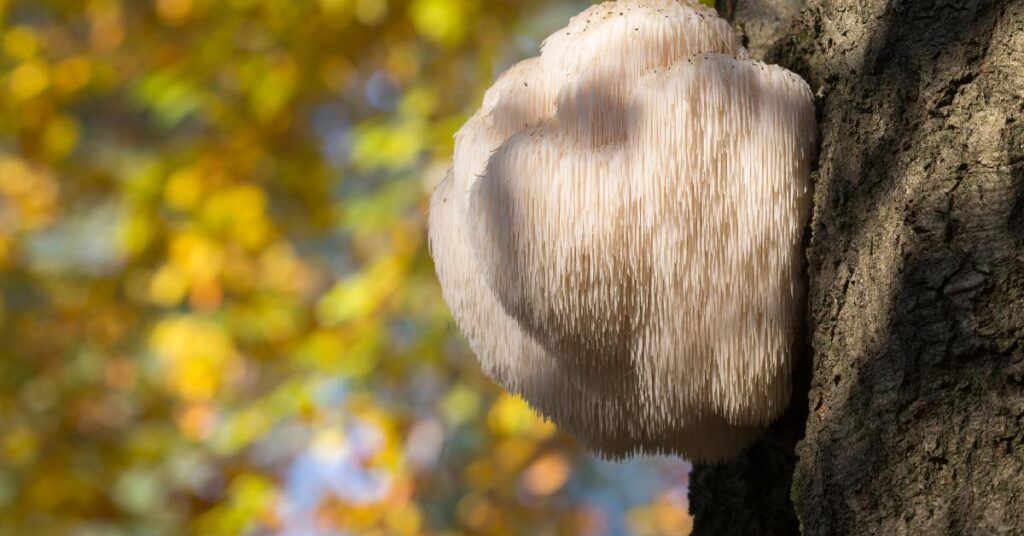
Delicious Lion’s Mane Mushroom Recipes
- Lion’s Mane Mushroom Stir-Fry: Create a colorful stir-fry with sliced mushrooms, bell peppers, broccoli, and your favorite seasonings.
- Lion’s Mane Mushroom Soup: Make a comforting soup by simmering Lion’s Mane mushrooms with vegetables in a flavorful broth.
- Lion’s Mane Mushroom Tacos: Add a unique twist to your tacos by replacing meat with sautéed Lion’s Mane mushrooms and topping them with fresh salsa.
Storing Lion’s Mane Mushroom
To extend the shelf life and preserve the flavor of Lion’s Mane mushrooms, follow these storage tips:
- Refrigeration: Place the cleaned mushrooms in a paper bag or a loosely closed container in the refrigerator. Avoid sealing them in plastic bags, as it can trap moisture and lead to spoilage.
- Freezing: For longer storage, consider freezing Lion’s Mane mushrooms. Simply blanch them quickly before freezing to retain their texture.
Lion’s Mane Mushroom Supplements
For individuals who can’t find fresh Lion’s Mane mushrooms, supplements of medicinal mushroom are available in various forms, such as capsules, powders, and extracts. These supplements offer a convenient way to enjoy the mushroom’s potential health benefits.
Safety Precautions
Although Lion’s Mane mushrooms are generally safe for consumption, it’s essential to take some precautions:
- Proper Identification: Always be sure of the mushroom’s identity before consuming it. If you are unsure, consult an expert or refrain from consuming it.
- Allergies: If you have allergies to mushrooms, it’s best to avoid Lion’s Mane mushrooms or consult a healthcare professional before trying them.
- Moderation: While Lion’s Mane mushrooms have numerous health benefits, moderation is key. Excessive consumption may lead to digestive discomfort in some individuals.
Does Lion’s Mane need to be washed?
Yes, it is essential to clean Lion’s Mane mushrooms thoroughly before consumption. While Lion’s Mane Mushroom grow in the wild, they may accumulate dirt, debris, or small insects. Gently brush the spines of the mushroom using a soft-bristled brush or a damp cloth to remove excess dirt and any surface impurities. Avoid soaking them in water as Lion’s Mane mushrooms can absorb excess moisture, affecting their texture and taste. Properly cleaning the wild mushrooms also ensures that you enjoy a safe and flavorful culinary experience.
How do you get bugs out of Lion’s Mane?
To remove bugs from Lion’s Mane mushrooms, begin by visually inspecting the mushrooms for any signs of insect infestation. If you find bugs or larvae on the surface, carefully remove them using tweezers or a small brush. Additionally, soaking the mushrooms in lightly salted water for a brief period can help dislodge insects. However, it is crucial to avoid extended soaking, as Lion’s Mane mushrooms can absorb excess water well, leading to a loss of texture. Thoroughly cleaning and promptly removing any insects will ensure your mushrooms are bug-free and safe to eat.
How long to soak Lion’s Mane mushrooms?
Lion’s Mane mushrooms should not be soaked in water for an extended period. Unlike some other mushrooms, they can easily absorb moisture, leading to a loss of their unique texture and flavor. If soaking cold water is necessary, keep it brief, no more than a minute or two, and ensure the mushrooms are promptly patted dry with a paper towel. Alternatively, consider using a damp cloth or soft brush to clean the mushrooms, as this method will prevent them from becoming waterlogged and maintain their delightful taste and appearance.
Does Lion’s Mane dissolve in water?
No, Lion’s Mane mushrooms do not dissolve in water. They are a type of fungus with a fleshy and firm texture, making seafood like them well-suited for various culinary applications. However, it’s important to note that Lion’s Mane mushrooms can absorb water if soaked for too long, which can impact their texture negatively.
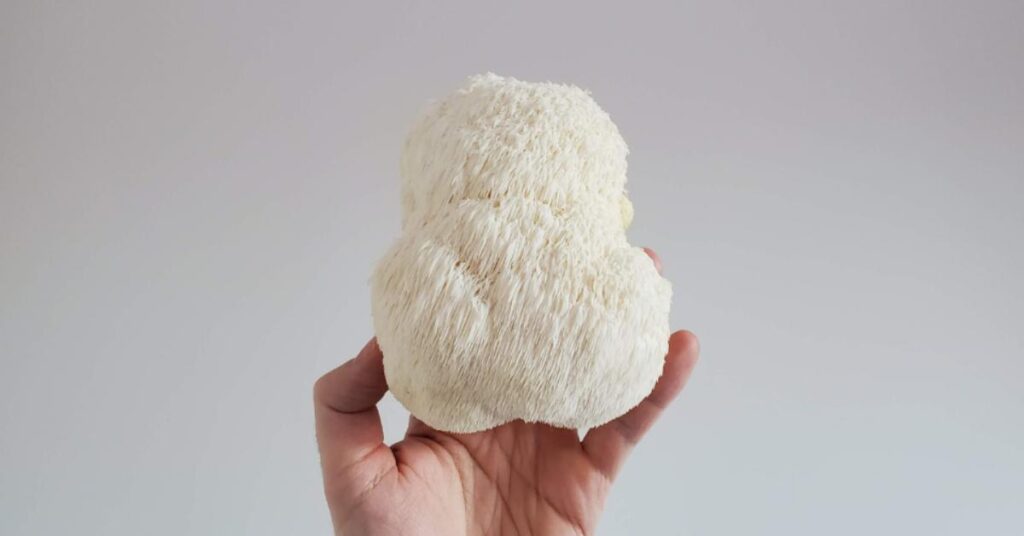
It is advisable to avoid excessive water exposure to store mushrooms and instead opt for gentle cleaning methods to retain the unique mushroom that’s unique consistency and ensure a delightful dining experience.
How long to cook Lion’s Mane mushrooms?
The cooking time for Lion’s Mane mushrooms depends on the chosen method. When sautéing, it typically takes 5 to 7 minutes over medium heat or medium high heat until golden brown. For roasting, preheat the oven to a moderate temperature and roast for about 15 to 20 minutes until tender and slightly caramelized. When grilling, cook the whole mushrooms for approximately 8 to 10 minutes, flipping them occasionally. Cooking times may vary based on the size and thickness of the mushrooms, so it’s best to keep a close eye on them to achieve the desired texture and flavor.
What does Lion’s Mane mushroom taste like?
Lion’s Mane mushroom has a unique and delightful taste profile. Its flavor can be likened to a combination of whole seafood or crab meat and mild mushrooms, with hints of sweetness and umami. The texture is tender and meaty, making it a popular choice for meat substitutes in vegetarian and vegan dishes. When cooked, Lion’s Mane mushrooms develop a crispy and caramelized exterior while retaining a soft and juicy interior. This distinct taste and meaty texture also make them a versatile ingredient in various culinary creations, adding depth and richness to soups, stir-fries, and other dishes.
FAQs
Can Lion’s Mane mushrooms improve memory and cognitive function?
Yes, Lion’s Mane mushrooms contain compounds that may enhance cognitive function and support brain health.
Are Lion’s Mane mushrooms safe for pregnant women?
Pregnant women should consult their healthcare provider before adding Lion’s Mane mushrooms to their diet.
Are there any side effects of consuming Lion’s Mane mushrooms?
Most people can consume Lion’s Mane mushrooms without adverse effects, but some individuals may experience mild digestive issues.
Can Lion’s Mane mushrooms be used to treat neurological disorders?
Research on Lion’s Mane mushrooms suggests potential benefits for certain neurological conditions, but more studies are needed for definitive conclusions.
Are Lion’s Mane mushroom supplements as effective as the fresh mushrooms?
While supplements offer convenience, the benefits of fresh Lion’s Mane mushrooms may be more pronounced due to their natural form.
Conclusion
Lion’s Mane mushrooms are not only a delightful addition to your culinary endeavors but cultivated mushrooms are also a potential source of various health benefits. From improving cognitive function to supporting the immune system, these unique mushrooms have garnered attention for their medicinal properties. Remember to properly harvest, clean, and prepare Lion’s Mane mushrooms to enjoy their delicious flavor and reap their potential health rewards about a week after. Embrace the wonders of Lion’s Mane mushroom in your kitchen and experience the magic of this remarkable fungi!
